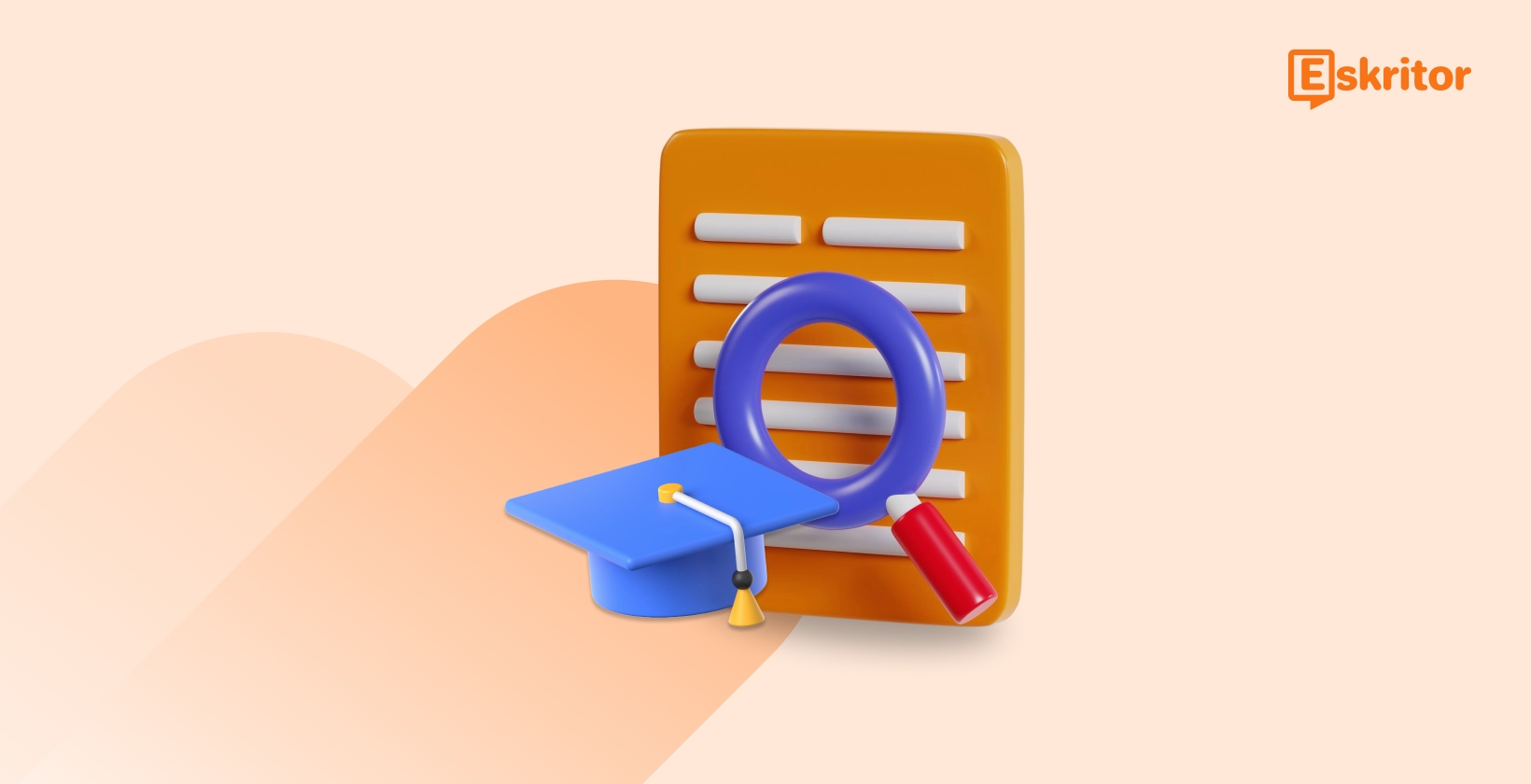
Top 8 Research Tools for Students in 2025
Generate the Best Content with AI in Seconds
Generate the Best Content with AI in Seconds
Research tools provide students with essential capabilities for managing academic information overload, improving source quality assessment, and enhancing overall research efficiency. Modern research tools, including a summary creator, address critical challenges students face when navigating the vast digital landscape of scholarly resources. Research tools specifically designed for academic purposes offer specialized features that general search engines lack.
Below are the top research tools that help students conduct high-quality academic research with greater clarity and confidence:
- Google Scholar : A free and user-friendly platform that indexes scholarly content across disciplines.
- JSTOR : A highly respected digital library providing access to peer-reviewed journals, books, and primary sources.
- ProQuest : An extensive research database offering dissertations, theses, newspapers, and multimedia content.
- Web of Science : A premier platform for citation analysis and high-impact journal access. ResearchGate : An academic social network and publication hub that enables researchers to access papers and communicate directly with authors. Microsoft Academic : An AI-powered tool that uses semantic search and a knowledge graph to deliver contextually relevant academic content.
- Zotero : A free, open-source reference management tool with powerful organizational features, ideal for collecting, managing, and citing research materials efficiently.
- Mendeley : A research and reference management platform combining PDF annotation, cloud syncing, and content recommendations.
Understanding the Need for Specialized Research Tools
The academic research landscape has transformed dramatically in recent years, with tools like a rewording tool for essays playing a significant role in refining written work. Students now have access to millions of scholarly articles, books, and resources at their fingertips—but this wealth of information can quickly become overwhelming without the proper tools to navigate it.
Modern research tools address several critical challenges that students face:
- Information overload: Filtering through massive amounts of data to find relevant sources
- Quality assessment: Determining the credibility and academic value of sources
- Organization: Keeping track of numerous sources across different projects
- Citation management: Ensuring proper attribution and avoiding plagiarism
- Time management: Completing research efficiently within tight deadlines
As educational institutions increasingly emphasize research skills, proficiency with digital research tools has become advantageous and essential for academic success. Let's explore the student-friendly research platforms available in 2025 that can significantly enhance academic performance.
Top 8 Research Tools for Academic Success
Selecting the right research tools, including the best text editor, can transform your academic experience. These specialized platforms provide access to high-quality sources, advanced search features, and organizational capabilities that general search engines simply cannot match.
Google Scholar
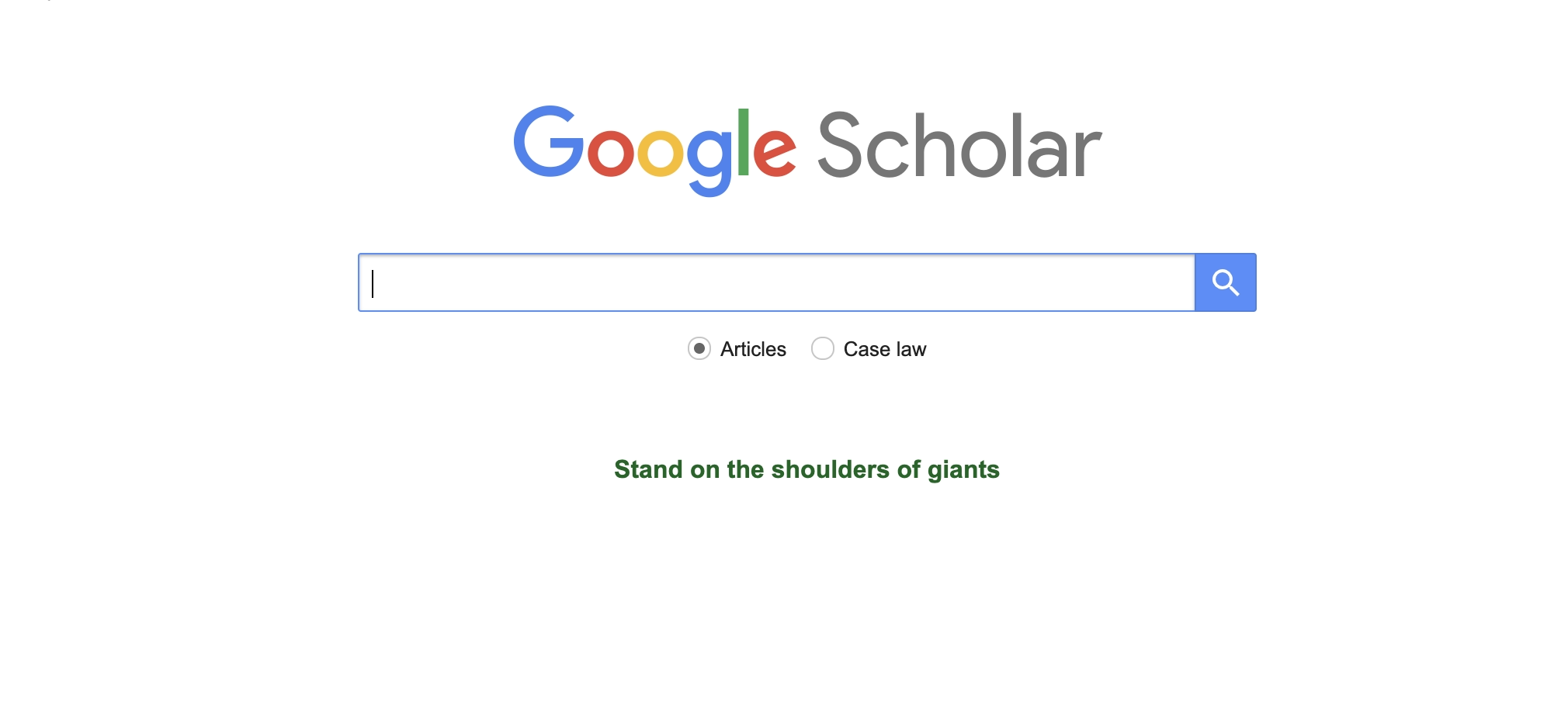
Google Scholar stands as one of the most accessible and comprehensive online research tools available to students. This free research platform indexes scholarly literature across numerous disciplines and sources, making it an essential starting point for academic research.
Google Scholar allows students to search a vast repository of scholarly content, including journal articles, theses, books, conference papers, and technical reports from universities and academic publishers worldwide.
Pros of Google Scholar as a research tool:
- Free access without institutional subscriptions required
- User-friendly interface similar to standard Google search
- Extensive coverage across disciplines and publication types
- Citation metrics to evaluate source impact and relevance
- "Cited by" feature to trace academic influence forward
Cons of Google Scholar as a research tool:
- Less sophisticated filtering options compared to specialized databases
- Uneven coverage across different academic disciplines
- Limited advanced search capabilities
- No quality control for indexed sources
- Occasionally outdated citation information
JSTOR
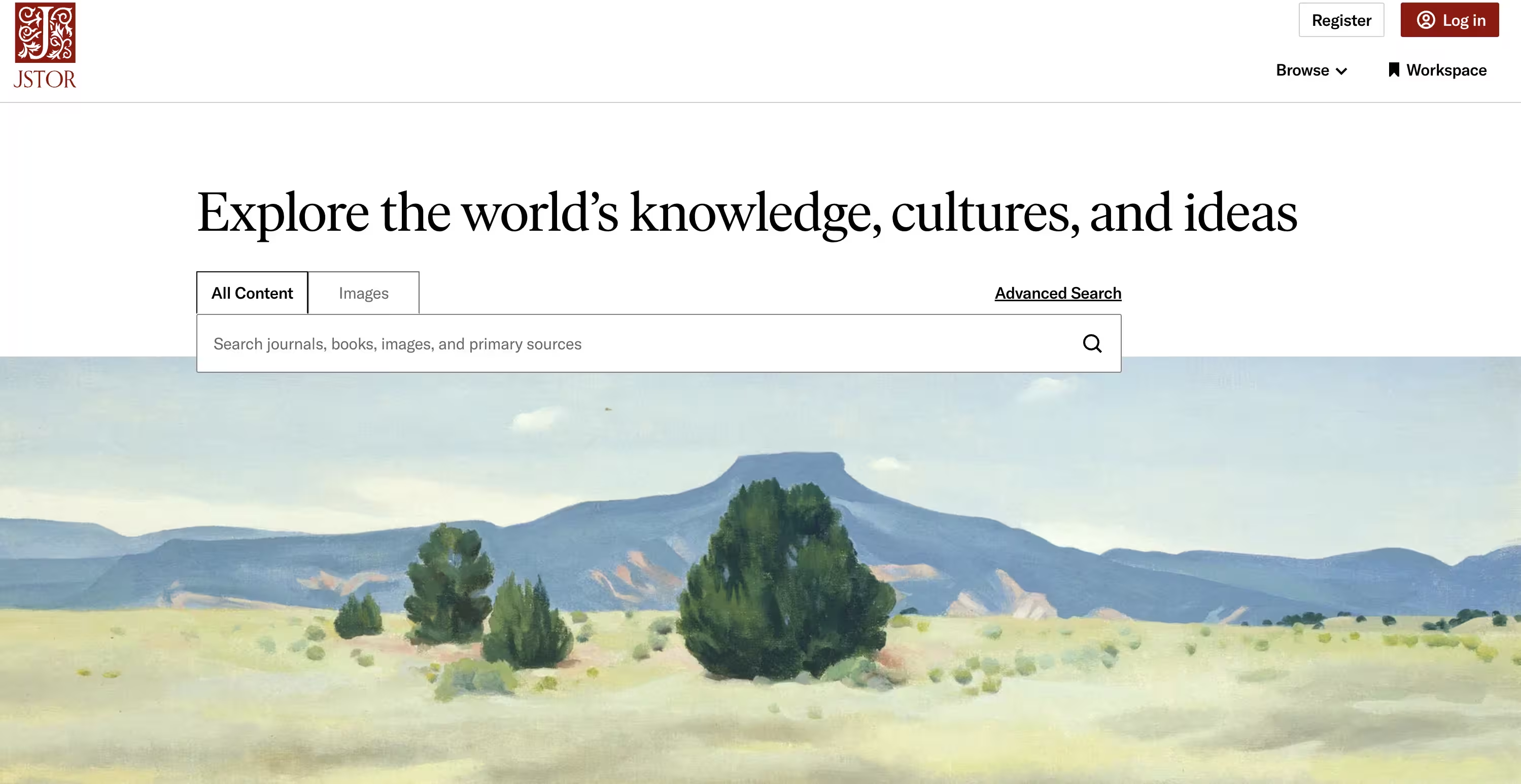
JSTOR represents one of the most respected digital library research tools for academic research, providing access to thousands of academic journals, books, and primary sources across the humanities, social sciences, and sciences. This comprehensive digital archive houses complete runs of scholarly journals with some collections dating back to the 1600s, creating an unparalleled historical research repository.
JSTOR's commitment to academic integrity ensures all content meets rigorous quality standards, making it particularly valuable for students writing papers requiring authoritative sources.
Pros of JSTOR as a research tool:
- Exceptionally high-quality, peer-reviewed content
- Complete journal runs with extensive historical archives
- Strong coverage in humanities and social sciences
- Text analyzer tool for discovering related content
- Clean, distraction-free reading interface
- Stable URLs that won't change or disappear
Cons of JSTOR as a research tool:
- Limited access without institutional subscription
- Free account restricted to only 100 articles per month
- Less comprehensive for recent publications (embargo periods)
- Weaker coverage in some STEM fields
- No citation tracking features
ProQuest
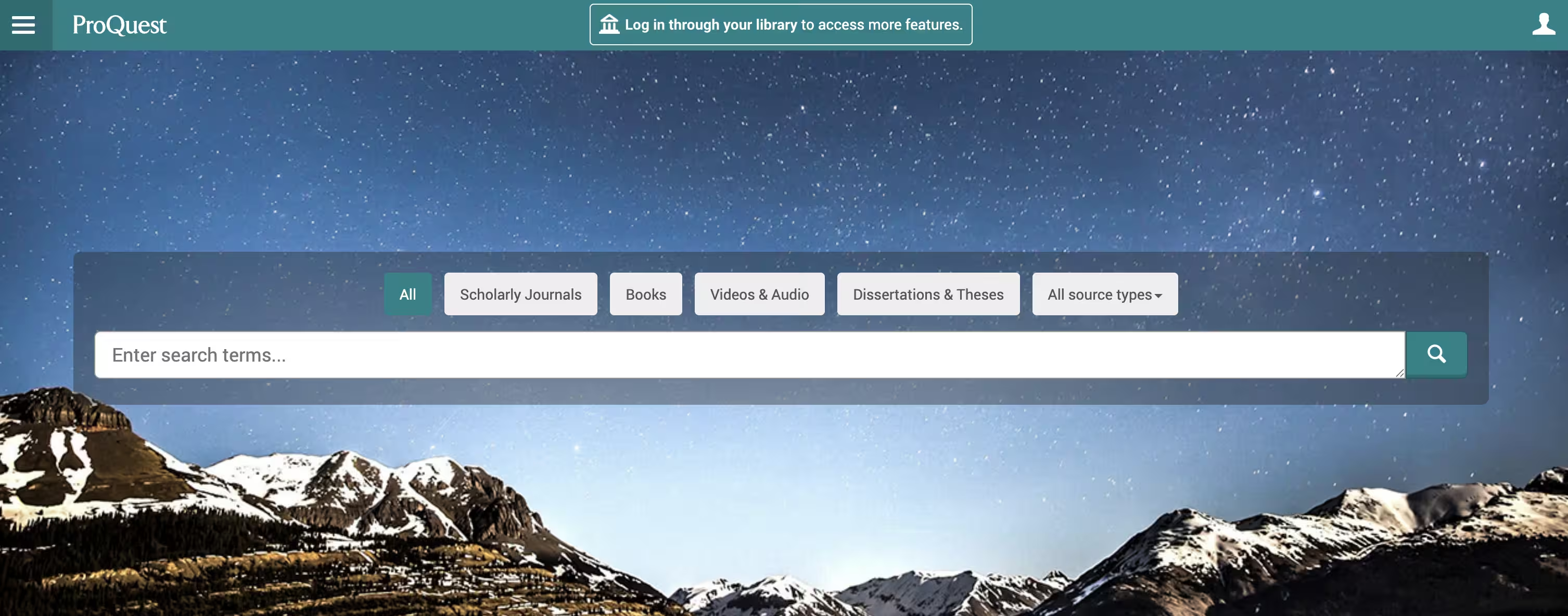
ProQuest delivers one of the most extensive collections of dissertations, theses, newspapers, and periodicals available, making it an invaluable research tool for in-depth academic research. This comprehensive platform serves as the official repository for doctoral dissertations from thousands of institutions worldwide, providing unprecedented access to original research across all disciplines.
ProQuest distinguishes itself through its diverse content types, including historical newspapers dating back centuries, current periodicals, business cases, government documents, and multimedia resources.
Pros of ProQuest as a research tool:
- Unparalleled dissertation and thesis collection
- Historical newspaper archives with full-text searchability
- Discipline-specific databases for targeted research
- Advanced search syntax for precise query construction
- Multimedia content integration (images, audio, video)
Cons of ProQuest as a research tool:
- Completely subscription-based with no free access tier
- Complex interface with steep learning curve
- Inconsistent coverage across different subject areas
- Occasional difficulty distinguishing between available and restricted content
- Search results can be overwhelming without proper filtering
Web of Science
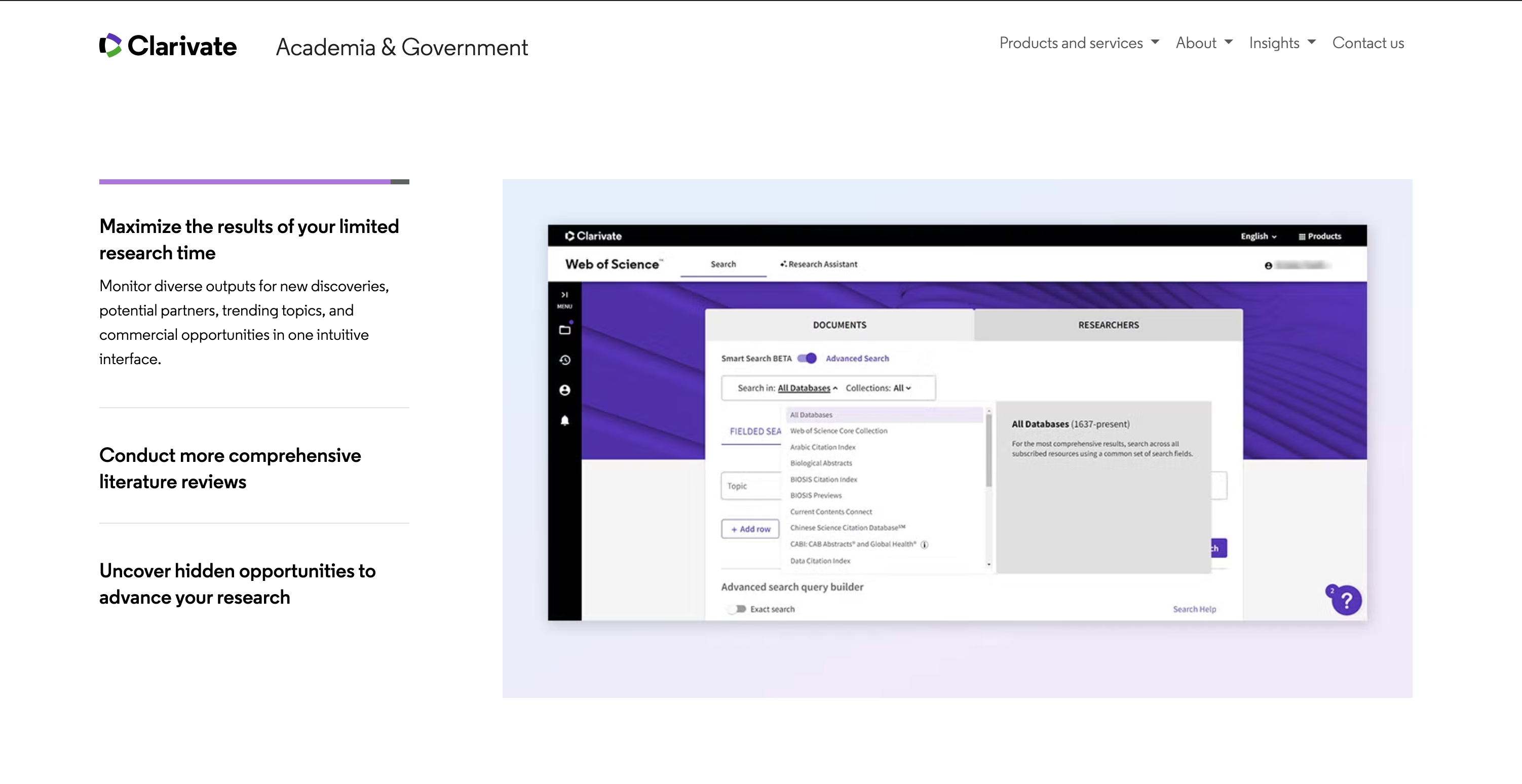
Web of Science provides powerful document analysis tools for academic papers and access to high-impact journals across all academic disciplines, making it a particularly valuable research tool for serious research projects. This premier research platform distinguishes itself through its selective indexing approach that focuses on high-impact, peer-reviewed journals, ensuring exceptional content quality for academic researchers.
Web of Science pioneered citation indexing, allowing researchers to trace the development of ideas forward and backward through time by following citation patterns. The platform's sophisticated analytics tools help researchers identify emerging research fronts, influential authors, and institutional leaders in specific fields.
Pros of Web of Science as a research tool:
- Selective indexing focusing on high-quality journals
- Industry-standard impact factor metrics
- Powerful citation analysis and mapping capabilities
- Identification of highly cited and influential papers
- Detailed author and institutional analytics
Cons of Web of Science as a research tool:
- An expensive institutional subscription with no individual access options
- More limited coverage than some competitors (especially in the humanities)
- Steeper learning curve for effective use
- Less intuitive interface for new users
- Limited to peer-reviewed content (omits gray literature)
ResearchGate
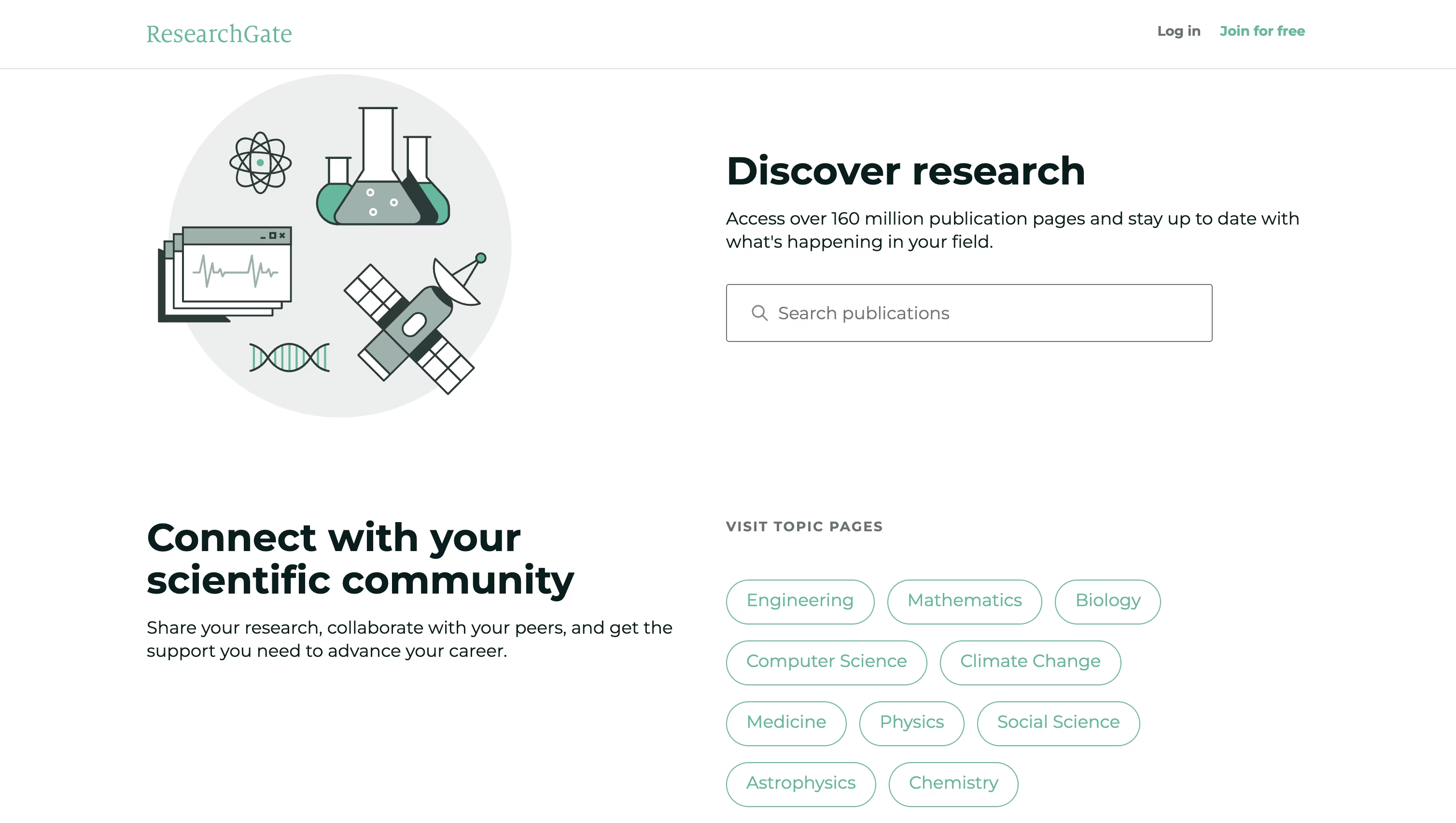
ResearchGate functions as both a research tool and an academic social network, allowing students to discover papers and connect directly with researchers in their field. This innovative platform bridges the gap between traditional research databases and academic networking by creating researcher profiles linked directly to their publications.
ResearchGate allows authors to upload preprints, postprints, and even published versions of their papers (where publisher permissions allow), creating an alternative access path to research that might otherwise remain behind paywalls. The platform's unique "request full-text" feature enables direct communication between readers and authors, often providing access to papers that would be inaccessible through other means.
Pros of ResearchGate as a research tool:
- Direct communication channel with the paper authors
- Access to preprints and author-shared full texts
- Academic networking opportunities
- Project collaboration tools for research teams
- Subject-specific Q&A platform with expert responses
Cons of ResearchGate as a research tool:
- Uneven content availability across disciplines
- Legal concerns about some shared publications
- Quality control issues with self-uploaded content
- Incomplete coverage compared to formal databases
- Commercial platform with advertising and data collection
Microsoft Academic
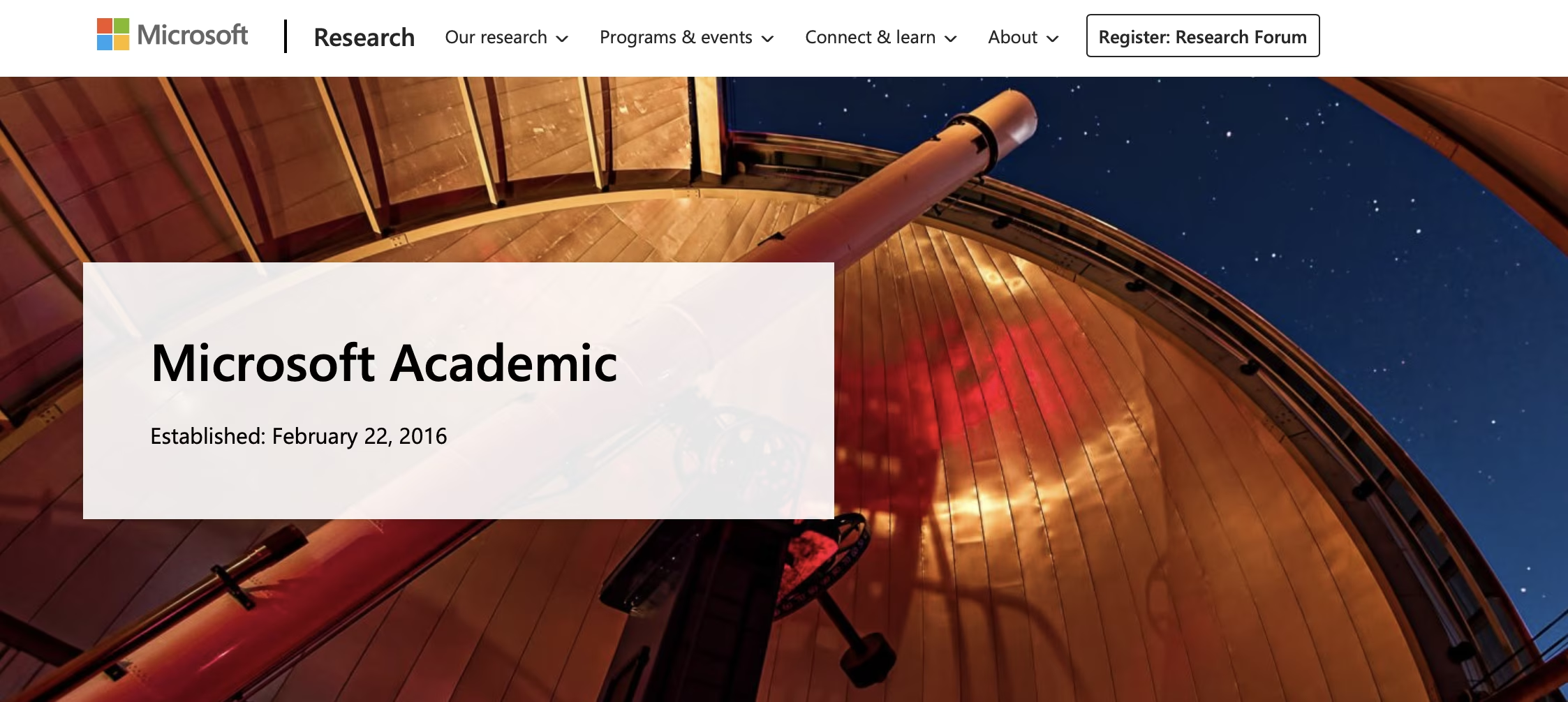
Microsoft Academic leverages artificial intelligence to provide semantic search capabilities that understand the meaning and context of research queries, making it an advanced research tool. This innovative platform utilizes a sophisticated knowledge graph connecting academic entities such as papers, authors, institutions, journals, and conferences to create a comprehensive map of the research landscape.
Unlike traditional keyword-based search engines, Microsoft Academic employs natural language processing to understand the semantic meaning behind search queries, delivering more contextually relevant results.
Pros of Microsoft Academic as a research tool:
- Powerful semantic search technology
- Comprehensive knowledge graph of academic entities
- Visual representation of research relationships
- Effective discovery of related topics and concepts
- Strong coverage across disciplines
Cons of Microsoft Academic as a research tool:
- Less comprehensive coverage than some specialized databases
- More limited filtering options for precise searches
- No direct access to full-text documents
- Occasional inaccuracies in publication attribution
- Less detailed metadata than specialized platforms
Zotero
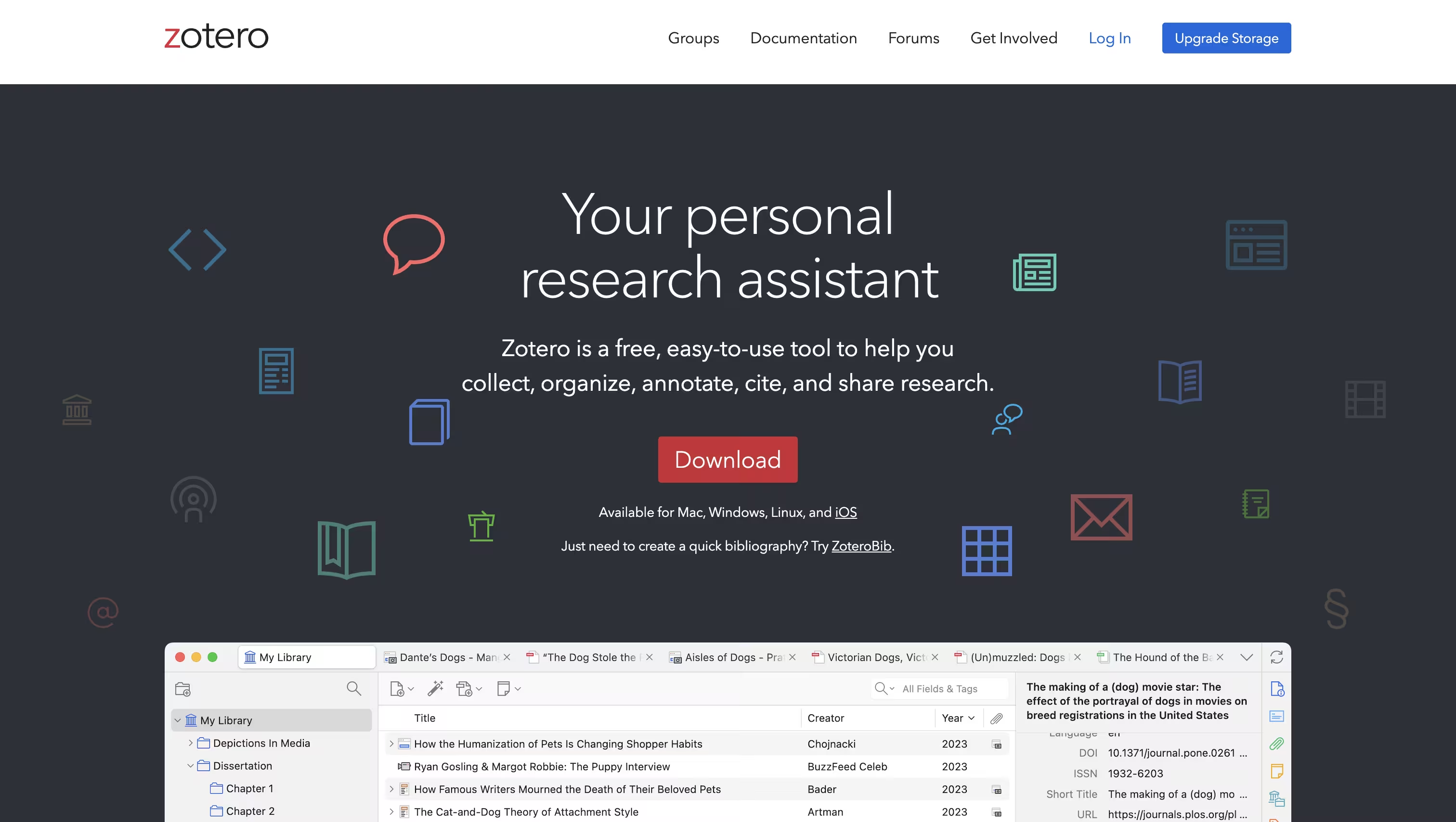
Zotero has become one of the most popular research organization tools for students due to its intuitive interface and powerful organization features. This open-source reference management software streamlines the entire research workflow by automatically capturing bibliographic information from web pages, PDFs, and databases with a single click. Zotero's browser extension can recognize and extract metadata from library catalogs, publisher websites, and academic databases, eliminating the time-consuming process of manual citation entry.
Beyond simple reference collection, Zotero functions as a complete research management system with robust organizational features including tags, collections, saved searches, and note-taking capabilities. The platform's collaborative functions allow research teams to create shared libraries with customizable permissions, making it ideal for group projects, lab work, and co-authored papers.
Pros of Zotero as a research tool:
- Completely free and open-source software
- Browser extension for one-click citation saving
- Automatic metadata extraction from PDFs
- Support for virtually all citation styles
- Built-in PDF annotation capabilities
Cons of Zotero as a research tool:
- Limited free storage (300MB) for syncing attachments
- Less sophisticated PDF annotation than dedicated tools
- Occasional metadata extraction errors requiring manual correction
- Group library management requires an internet connection
- Steep learning curve for advanced features
Mendeley
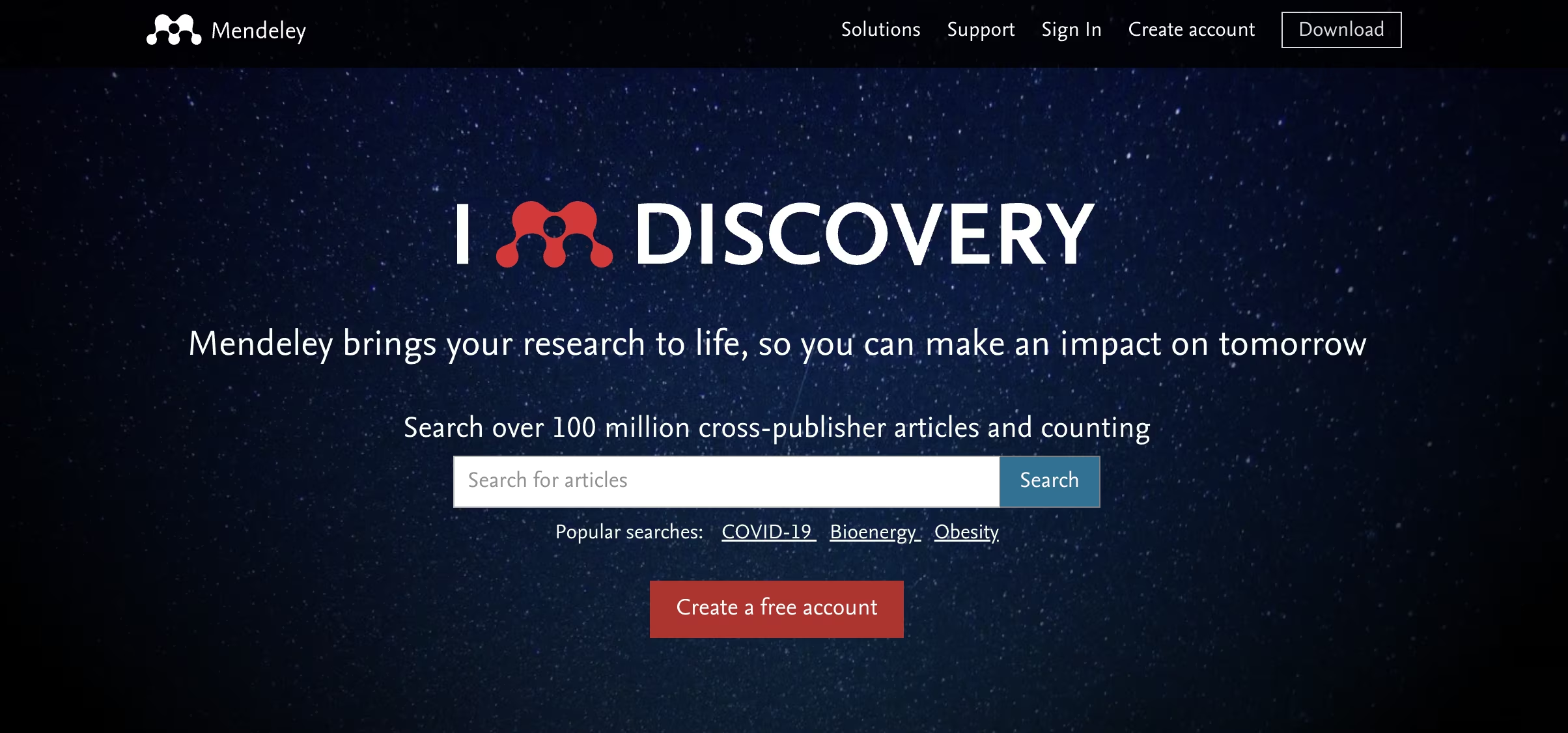
Mendeley combines reference management with PDF reading and annotation features, creating a comprehensive research workflow solution and versatile research tool. This powerful platform integrates citation management, document organization, PDF annotation, and academic networking into a unified research ecosystem. Mendeley's desktop application synchronizes with web and mobile versions, allowing researchers to access their libraries across multiple devices.
The platform's sophisticated PDF reader includes highlighting, sticky notes, and text annotation capabilities that sync across devices, eliminating the need to switch between separate reading and citation tools. Mendeley's recommendation engine analyzes researchers' libraries to suggest relevant papers, potentially discovering important sources that might be missed through traditional search methods.
Pros of Mendeley as a research tool:
- Generous free storage (2GB) for synchronized documents
- Sophisticated PDF reader with advanced annotation tools
- Cross-platform compatibility (Windows, Mac, Linux, iOS, Android)
- Integrated academic social network for researcher connections
- Smart recommendation engine based on library contents
Cons of Mendeley as a research tool:
- Owned by Elsevier with data privacy concerns
- Less open ecosystem than open-source alternatives
- Some advanced features require a premium subscription
- Occasional synchronization issues between devices
- Limited customization options for citation styles
How Eskritor Complements Research Tools
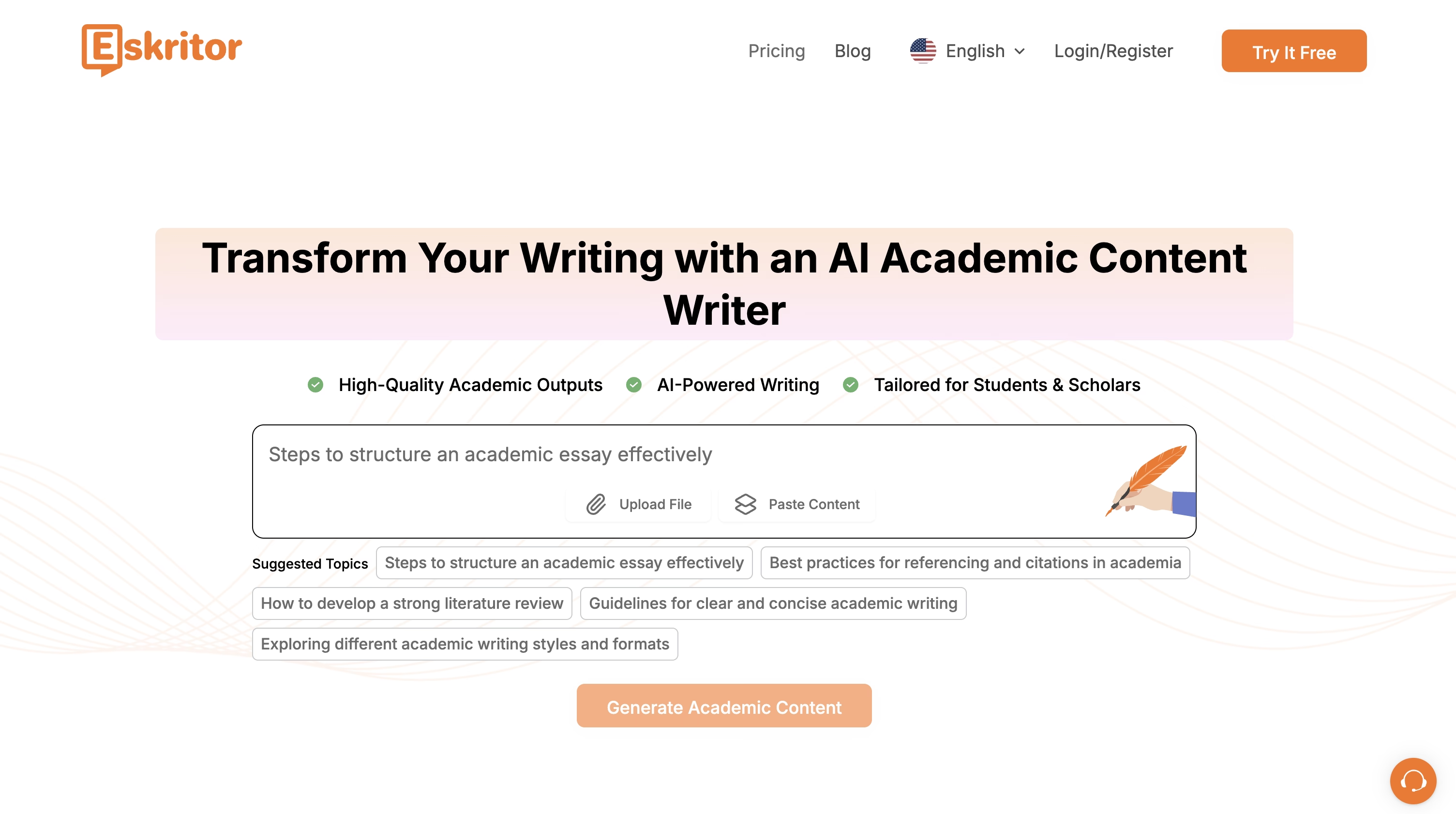
While research tools excel at helping students find and organize sources, Eskritor is academic writing software that bridges the gap between research and writing by transforming collected information into polished academic content. Eskritor's AI-powered capabilities help students convert disorganized research notes into coherent, structured content.
When you've gathered information from various research tools, Eskritor helps you:
- Upload and organize documents: Import PDFs, Word files, and other formats directly into the platform
- Extract key information: Identify the most relevant points from your research materials
- Structure content logically: Organize information into a coherent academic format
- Generate transitions: Create smooth connections between different research points
- Maintain consistent style: Ensure your writing maintains an appropriate academic tone
Eskritor allows students to import their research findings directly from PDFs or Word documents, creating a transition from research collection to content development. The platform's ability to save work for future use also enables students to build their papers gradually as they continue researching.
Beyond organizing research, Eskritor's AI capabilities help students develop higher-quality academic content.
Eskritor enhances research papers through:
- Custom prompts for academic writing: Specialized instructions for different types of academic assignments
- Content enrichment: Addition of relevant examples, data points, and supporting evidence
- Language refinement: Improvement of clarity, precision, and academic tone
- Format customization: Professional presentation of research findings
- Citation integration: Incorporation of sources from research tools
Conclusion
The research landscape for students continues to evolve rapidly, with increasingly powerful tools becoming available each year. By mastering the research tools discussed in this guide—Google Scholar, JSTOR, ProQuest, Web of Science, ResearchGate, Microsoft Academic, Zotero, and Mendeley—students can dramatically improve both the quality of their research and their academic efficiency.
Eskritor serves as the crucial bridge between research collection and content creation, helping students transform their findings into polished academic papers. Its AI-powered features complement traditional research tools, creating a comprehensive solution for the entire academic workflow from initial research to final submission.
Ready to transform your research process? Try Eskritor today and see how its powerful AI capabilities can help you create better academic content in less time.
Frequently Asked Questions
Tools like Turnitin and Grammarly offer plagiarism detection, but Eskritor supports originality by helping students rephrase content, cite sources properly, and generate unique drafts from scratch using AI prompts. Its writing assistant encourages ethical writing practices by embedding references naturally.
Effective academic writing software should include document organization capabilities, formatting options for academic standards, grammar and style checking, citation management, revision history, and ideally AI assistance for content development. Look for tools that integrate with reference managers and support multiple file formats for seamless workflow.
Eskritor complements research tools by helping students transform their collected research into polished academic content. Its AI features allow you to upload documents, organize information, develop content using custom prompts, enrich text with supporting evidence, and format papers professionally—bridging the gap between research collection and final paper submission.
For collaborative research, consider using ResearchGate for team discussions about sources, Mendeley or Zotero for shared reference libraries, and cloud-based storage for document sharing. Eskritor supports collaboration by allowing you to import documents from multiple team members and synthesize them into a cohesive final product with consistent formatting.
Implement time-saving research solutions for students by using advanced search operators in databases, creating research templates for common assignments, capturing citations during initial discovery, scheduling regular synthesis sessions, and using Eskritor to quickly transform research notes into structured content enhanced with AI-generated elaborations and transitions.





 location
location